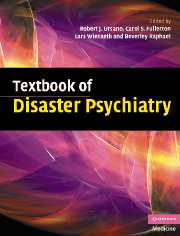Book contents
- Frontmatter
- Contents
- List of contributors
- Preface
- Part I Introduction
- Part II Foundations of disaster psychiatry
- 2 Epidemiology of disaster mental health
- 3 Children and disasters: public mental health approaches
- 4 Disaster ecology: implications for disaster psychiatry
- 5 Neurobiology of disaster exposure: fear, anxiety, trauma, and resilience
- Part III Clinical care and interventions
- Part IV Special topics
- Part V Public health and disaster psychiatry
- Index
- References
4 - Disaster ecology: implications for disaster psychiatry
from Part II - Foundations of disaster psychiatry
Published online by Cambridge University Press: 09 August 2009
- Frontmatter
- Contents
- List of contributors
- Preface
- Part I Introduction
- Part II Foundations of disaster psychiatry
- 2 Epidemiology of disaster mental health
- 3 Children and disasters: public mental health approaches
- 4 Disaster ecology: implications for disaster psychiatry
- 5 Neurobiology of disaster exposure: fear, anxiety, trauma, and resilience
- Part III Clinical care and interventions
- Part IV Special topics
- Part V Public health and disaster psychiatry
- Index
- References
Summary
The nature of disaster from an ecological perspective
When disaster strikes, individuals, families, and entire communities are subjected to powerful forces of harm. Yet, exposure to disaster impact is only the opening salvo. As the disaster unfolds, and far into the aftermath, affected populations grapple with loss and change, consequences that persevere long after the risk for physical harm has dissipated. This trilogy of forces – exposure to hazard, massive personal and societal loss, and profound and enduring life change – characterizes the nature of disaster. Thus we define a disaster as an encounter between a hazard (forces of harm) and a human population in harm's way, influenced by the ecological context, creating demands that exceed the coping capacity of the affected community (Landesman, 2001; Noji, 1997a; Quarantelli, 1985, 1995, 1998; Shultz et al., 2007; Somasundaram et al., 2003; World Health Organization, 1999).
Disasters are population-based phenomena. According to Raphael (2000), “Disasters can have widespread and devastating impact on individuals, families, communities and nations.” Disasters are collective, community-wide events, necessitating simultaneous consideration of issues residing within a person, or between persons, or between persons and their community and society. We propose an ecological frame of reference to concurrently consider the interplay of these factors as they pertain to disaster's forces of harm: exposure, loss, and change.
Keywords
- Type
- Chapter
- Information
- Textbook of Disaster Psychiatry , pp. 69 - 96Publisher: Cambridge University PressPrint publication year: 2007
References
- 20
- Cited by

